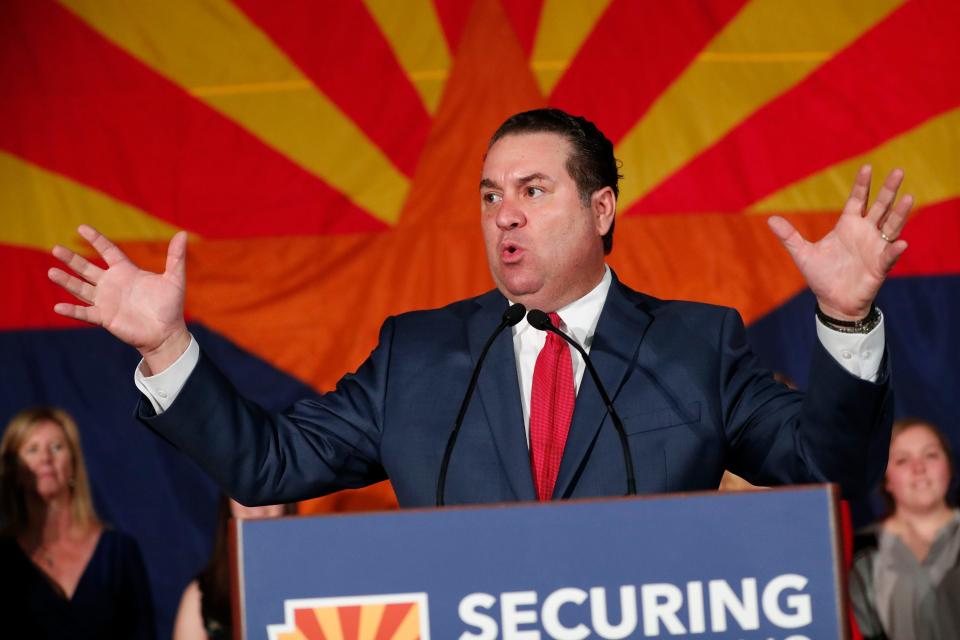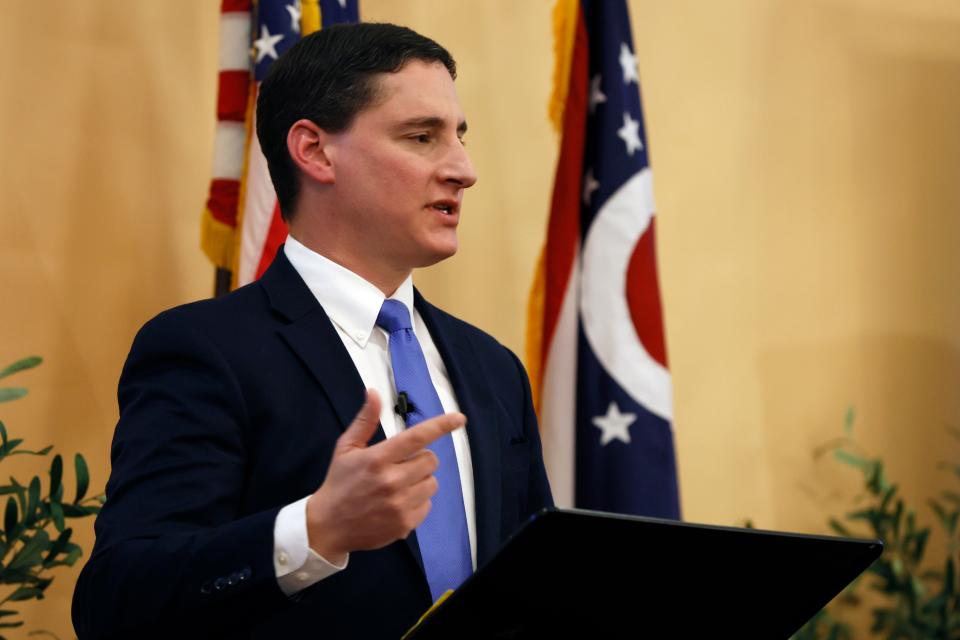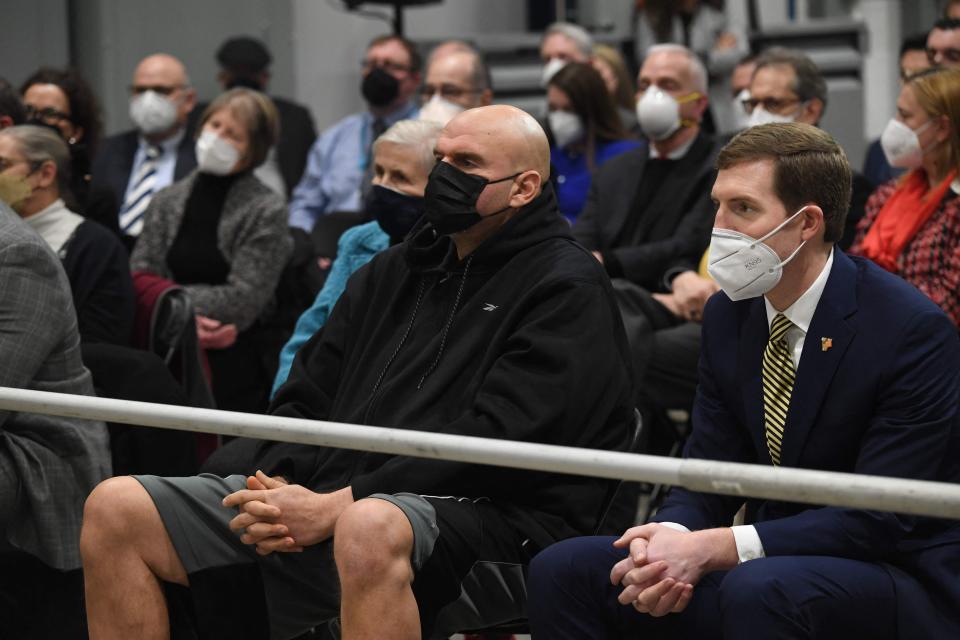Pennsylvania, Arizona, Alabama: the Senate primary races to watch in 2022
- Oops!Something went wrong.Please try again later.
WASHINGTON – A series of consequential primary races this spring and summer will shape the Senate field before the November midterm general elections, with control of the chamber and the fate of President Joe Biden's political agenda at stake.
Thirty-four Senate seats are up for election in November. The Senate is currently evenly split with 50 Democratic Caucus members and 50 Republican members, with Vice President Kamala Harris’ ability to cast tie-breaking votes giving Democrats the majority. A gain or loss of even one seat could tip control of the chamber firmly in one party's favor, giving each race added importance.
The primary elections – in which candidates compete for their party's nomination – will determine who faces off in the general election battle for the upper chamber. In some cases, the winner of the primary may be the de facto winner of the general election given the partisan sway of the state, but in others the primary can determine how competitive the general becomes.
On the Republican front, the primaries provide a test of former President Donald Trump's grip on the party on the Republican party. Trump-aligned candidates face fellow Republicans in a number of closely watched races across the nation. Democrats, on the other hand, continue to debate whether progressives or moderates provide their party the best chance of victory.
This cycle, Republican primaries are more competitive than their Democratic counterparts. The majority of Senate retirements are on the Republican side, creating more consequential races for open seats.
“Inherently, there’s more action on the Republican side,” said Kyle Kondik, managing editor of the nonpartisan Sabato's Crystal Ball at the University of Virginia Center for Politics, which tracks campaigns and elections. “Basically, all the seats that the Republicans are targeting, in terms of the Democratic seats, Democrats have incumbents running in those races.”
Democrats hope a contentious Republican primary scene can aid their chances at holding the majority.
“Whoever emerges from this infighting is going to be badly weakened, and out of step with a lot of the voters who will decide the general election in these states,” said Jazmin Vargas, spokeswoman for the Democratic Senatorial Campaign Committee, the Senate Democrats' campaign arm.
“You couldn't ask for a better dynamic if you're Democrats than having an established brand with no primary against Republicans who are going to be battling it out on the airwaves over social issues,” said Democratic strategist Jared Leopold of the primary field.
But Republicans see competitive primary fields as a benefit.
"Our primaries will forge tougher candidates and better General Election campaigns while the Democrat primaries will do nothing but highlight how liberal their party has become," said T.W. Arrighi, press secretary for the National Republican Senatorial Committee, Senate Republicans' campaign organization.
The primaries can also offer previews of what themes will drive the midterm elections, and what type of candidates and appeals speak to voters.
Across the Republican primaries, Trump reigns large. It is the first midterm election since he lost in 2020, and while he remains the most influential name in the Republican party, it remains to be seen exactly the extent of his impact in backing GOP candidates when he is not on the ticket as well.
More: Trump-backed Pa. Senate candidate Sean Parnell loses custody battle, suspends campaign
“He is trying to portray himself as a kingmaker, but the reality is he really hasn’t cleared any primary,” argued Vargas.
Here are the primaries to watch in the lead-up to the midterms:
Alabama
Sen. Richard Shelby, R-Ala., announced in February that he would retire at the end of his sixth term in the Senate, setting off a competitive Republican contest to fill his seat. In May, Alabama Republicans will vote to determine which candidate will lead the GOP ticket in November. If no candidate wins a majority, a runoff will be held the following month. Given the partisan lean of the state, the Republican who clears the field is expected to easily win the general election and to join the Senate Republican Caucus.
The primary will pit Shelby’s chosen successor versus former Trump’s preferred candidate.
Shelby’s former chief of staff, Katie Britt, has his endorsement. Britt has ties to the business community as the former president of the Business Council of Alabama, and has outraised the rest of the field. She’s also garnered praise from several Senate Republicans and, according to Politico, she has received donations from some of their leadership PACs.
Trump’s candidate in the race is Rep. Mo Brooks, who was elected to Congress in 2010 and previously ran for his party’s Senate nomination in 2017. Last year on Jan. 6, Brooks spoke ahead of Trump at a rally before the Capitol riots. Brooks previously criticized Trump, and his opposition to the former president was used against him in his prior Senate run. This time around, however, Brooks has embraced Trump, and Trump endorsed him in April.

The results of the primary will be an early test of Trump’s power over the party. Trump holds sway in Alabama – a state he won twice – and waded into the state’s last Senate primary in opposition to his former Attorney General Jeff Sessions, who lost to the eventual winner, Sen. Tommy Tuberville. His support of Brooks, however, shows signs of strain: CNN reported in December that Trump has soured on Brooks and is closely monitoring the race.
Army veteran Mike Durant, perhaps best known as a pilot in the Black Hawk Down raid, is also running in the GOP primary.
Arizona
In August, Arizonans will vote for which Republican will take on Sen. Mark Kelly, D-Ariz., in what will likely be one of the most contentious and costly Senate battleground races. While Kelly is on the ballot, it’s his colleague Sen. Kyrsten Sinema, D-Ariz., who has drawn ire from Democratic outside groups, donors, and candidates over her opposition to changing Senate rules to approve voting rights legislation.
More: Sen. Kyrsten Sinema censured by Arizona Democratic Party executive board over filibuster vote
Sinema, who is not up for reelection in 2022, may be in focus, but Kelly still faces a challenging race despite his strong candidacy and fundraising prowess. Biden was the first Democrat to carry Arizona in the presidential race since Bill Clinton, and Republicans hope to regain the Senate seat once held by GOP Sen. John McCain.
Republicans are eager to find a competitive candidate to take Kelly on – just two years after he won the seat in a special election.

State Attorney General Mark Brnovich, solar company executive Jim Lamon, Thiel Capital executive Blake Masters, and retired adjutant general of the Arizona National Guard Mick McGuire are vying for the GOP nomination. Lamon is largely self funded and has already given more than $5 million to his own campaign. Masters has the financial backing of billionaire Peter Thiel, who gave $10 million to a PAC backing his candidacy.
Arizona was the focus of many of Trump's disproven claims of election fraud. His endorsement may well be determined by how the candidates view and speak about the 2020 election: following initial criticism from Trump for certifying the results, Brnovich made "election integrity" a central pillar of his campaign, and Lamon claims credit for driving the audit effort.
Immigration and promises to secure the border are also central to all of the Republican campaigns, and likely to be a major policy issue in both the primary and general elections.
Arizona Audit: 'You’ll get nothing out of this': Partisans with limited experience stumble through gaffe-prone 'audit'
Gov. Doug Ducey, R-Ariz., has denied reports that he is contemplating running for the seat, but could still enter the race. Ducey would enter the field with substantial name recognition and a proven record of statewide success, but running for federal office raises different challenges, and Trump is a major critic of the governor. The candidate field won’t be set until the filing deadline in April.
Missouri
Republican Sen. Roy Blunt’s announcement he would not seek reelection set off a competitive GOP primary of top elected officials in Missouri.
More: Sen. Roy Blunt won't run for reelection, complicating Republicans' bid to retake the Senate
The crowded field includes former Gov. Eric Greitens, Rep. Vicky Hartzler, Rep. Billy Long, state Attorney General Eric Schmitt, and lawyer Mark McCloskey, who is best known for pointing a gun at Black Lives Matter protesters.
Many of the candidates have brought on Trump’s former aides and are seeking his endorsement: Kellyanne Conway is advising Long and Kimberly Guilfoyle is the national chair of Greitens’ campaign.
Greitens resigned in 2018, amid allegations he sexually assaulted and blackmailed his mistress and stole donor data from a charity he founded.
North Carolina
Republican Sen. Richard Burr’s decision to not seek reelection led to a large field of candidates on both sides of the aisle. While Democrats have coalesced around former state Supreme Court Justice Cheri Beasley, the Republican ticket remains competitive.
Former Gov. Pat McCrory and Rep. Ted Budd lead the field, which also consists of former Rep. Mark Walker and Army veteran Marjorie Eastman. McCrory has tried to tailor his campaign to appeal to independent voters, but would likely face questions in the general election over HB2, the controversial anti-LGBT bill he signed into law.
Trump endorsed Budd in June. Walker toyed with the idea of dropping out of the race to run for a new House seat at the urging of Trump – who Walker said offered to endorse him if he ran in that race instead – but announced on Thursday he would continue his Senate campaign.

Complicating the matter, in December, the state Supreme Court postponed the primary from March to May, and last week the state Legislature voted to push the primary to June.
North Carolina primary: North Carolina candidate filing suspended, primary rescheduled
The date of the primary has been in flux as a result of the debate over the legality of newly proposed congressional maps, a side effect of the delayed census.
Ohio
A wide field of Republicans are competing to replace retiring Sen. Rob Portman, R-Ohio.
The lineup includes former state treasurer Josh Mandel, "Hillbilly Elegy" author JD Vance, former chair of the Ohio Republican party Jane Timken, car dealer and technology executive Bernie Moreno, and Trump’s 2016 campaign state finance co-chair Mike Gibbons.

The group fighting for Trump’s coveted endorsement has a mixed record with the former president. NBC reported that Moreno once called him a “maniac,” and Vance was a Trump critic in 2016. Now, however, all of the candidates are leaning into Trump’s brand of politics, and Moreno and Vance have backtracked their criticisms.
More: 'Hillbilly Elegy' author J.D. Vance announces Senate bid, joins crowded GOP primary in Ohio
The exception in the field is state Sen. Matt Dolan, whose family owns the Cleveland Guardians, and who Trump already said he won’t endorse.
The winner of the May primary will likely face Rep. Tim Ryan, D-Ohio. While the state leans red and was won twice by Trump, Democrats are optimistic they can win in a state that already has a Democratic senator, Sherrod Brown.
“It's become this battle of, you know, who is going to go the most extreme on social issues, and it leaves a path for Tim Ryan to talk about blue collar, bread and butter issues that play really well in Ohio,” said Leopold.
“It's still a tough feat for Democrats,” he said, “But you couldn't ask for a better dynamic.”
Pennsylvania
Pennsylvania is home to competitive Democratic and Republican primaries this cycle following Republican Sen. Pat Toomey’s announcement he would not seek reelection. There is not a clear frontrunner on either side of the aisle yet, and both parties have attracted a large bench of candidates.
“Pennsylvania is definitely the Democratic primary to watch,” said Leopold. “You have a sort of left versus center battle, but more important in Pennsylvania you've got an east versus west battle.”
On the Democratic front, progressives and moderates are duking it out, each with the belief that they hold the key to flipping the battleground-state seat. Lt. Gov. John Fetterman is running a populist campaign, and has attracted national attention.
State Rep. Malcolm Kenyatta, the first openly LGBT person of color elected to the General Assembly, could draw support from the crucial Philadelphia area where he is based.

Rep. Conor Lamb is the foremost moderate in the field, running as a centrist who argues that he has proven his ability to win in challenging political environments against a well-funded GOP candidate. Montgomery County Commission chair Val Arkoosh, meanwhile, argues she can break through with suburban voters.
Trump endorsed Sean Parnell for the Republican nomination early in the race, but Parnell suspended his campaign in November amid allegations of domestic abuse. Following the end of Parnell’s campaign, daytime television host and cardiothoracic surgeon Dr. Mehmet Oz announced he would run for the seat. Oz’s campaign has attracted attention, but the race is far from decided.
This month, Bridgewater Associates CEO David McCormick jumped into the race, gaining Parnell’s endorsement. McCormick has deep pockets to self-fund his effort, and Politico reports he's brought on several Trump allies to his campaign, despite criticizing the former president in the past.
Former U.S. ambassador to Denmark during the Trump administration, Carla Sands, and real estate developer Jeff Bartos are also among the Republicans vying for the position. With Trump’s original pick dropping out of the race, he has not endorsed another candidate and the race is likely to be expensive due to the personal wealth of the candidates.
This article originally appeared on USA TODAY: 2022 midterm elections: The Senate primaries that will shape the race

